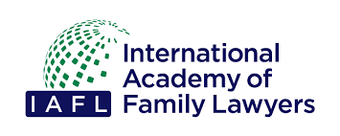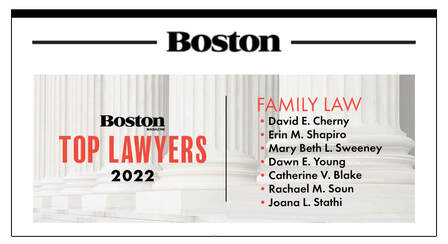SERVICES
|
We represent individuals in all aspects of divorce, custody, alimony, child support, paternity, restraining orders, domestic violence and related matters throughout all counties in Massachusetts. The firm has a lifetime of experience in the area of family law. We have practiced extensively in the Probate and Family Courts in Massachusetts and are familiar with the judges who may be involved in your case. We provide a high level of service to our clients during this difficult time and are responsive to your questions and concerns, and return communications with our office promptly. Our attorneys are skilled at negotiating a settlement, but also have the ability to advocate for you in court to protect your rights and interests in court. Our divorce and family law attorneys, capably assisted by our experienced paralegals and support staff, work hard to achieve your goals.
Atwood & Cherny’s Boston-Back Bay, Andover, and Northborough locations are conveniently accessible to its clients. The firm practices in all venues of the Commonwealth of Massachusetts as well as the State of New Hampshire.
|
Divorce can be an emotionally grueling process and often contentious. Unfortunately, nearly half of all marriages in the United States end in divorce. Choosing the right lawyer who can guide you through this process while protecting your interests is the most important decision you will make. The lawyers at Atwood & Cherny, P.C. welcome the opportunity to assist you.
Atwood & Cherny, P.C. offers an array of services in the area of family law in addition to litigation and appellate work. Many of our attorneys are trained in Alternative Dispute Resolution and serve as Court Appointed Masters, Conciliators and Guardian Ad Litems.
|
|
LITIGATION
The firm of Atwood & Cherny, P.C. provides strong advocacy inside the courtroom. Our attorneys have extensive experience in all aspects of litigation, including handling motion sessions, evidentiary hearings, contempt proceedings, pretrial conferences and trials. MEDIATION
Mediation is a voluntary and confidential process controlled by the parties. They hire a mediator who serves as a “neutral.” Mediation can provide the certainty, control and peace of mind that is lacking in litigation. Parties are encouraged to hire their own lawyers to advise them throughout this process and review any agreements reached during mediation. The attorneys at Atwood & Cherny, P.C. are skilled in advising their clients in mediation on how to make effective use of the process to achieve their goals and achieve agreement. In addition, several attorneys at Atwood & Cherny, P.C. have been trained and certified as mediators. They bring a level of sophistication to the mediation process and familiarity with the law and complex legal issues. They can assist in providing information about the law, identifying when experts are needed, and making sure that tax considerations are taken into account. They will also attempt to guide the parties in fashioning an agreement that will withstand the scrutiny of a judge when it is presented for approval to the court. For more information, please contact Mary Beth L. Sweeney, Thomas D. Ritter, or Catharine V. Blake. APPEALS
The attorneys of Atwood & Cherny, P.C. have represented clients before the Massachusetts Appeals Court, Massachusetts Supreme Judicial Court, U.S. First Circuit Court of Appeals, and the United States Supreme Court. Many of these appellate cases have established new, groundbreaking precedence in family law as well as resulted in legislative changes in reaction to the court’s decisions. ALTERNATIVE DISPUTE RESOLUTION
Alternative methods of resolving matters outside the courtroom include mediation, conciliation, collaborative law and arbitration. These methods of resolution are inherently less adversarial, reducing the emotional toll on the parties and children in a divorce and often are more cost effective than litigation. Atwood & Cherny has experienced attorneys who offer these services and are available to discuss whether one of these methods is the right one for your matter |
COURT APPOINTED MASTERS,
CONCILIATORS, & GUARDIANS AD LITEM Courts often appoint attorneys to serve as “masters” for discovery matters, to sell real estate, divide personal property in a divorce as well as many other reasons. Courts also appoint “Guardian Ad Litems” in a number of family law matters involving the care and custody of children. Some courts also refer cases to court appointed conciliators to see if the case can be resolved by an experienced family law attorney without the need of utilizing valuable trial time. Many of the attorneys at Atwood & Cherny, P.C. have been trained and certified by the courts to serve in these capacities and are also often selected by other attorneys by agreement to function in these roles. David E. Cherny has served as a master in a number of complex family law matters, both by appointment of the Court and selection by family law attorneys. David E. Cherny is also available for case reviews. Erin M. Shapiro is trained to serve as a Guardian Ad Litem. Her trial experience in child custody matters compliments her ability to investigate and analyze complicated and sensitive child-related matters. Mary Beth Sweeney has served as a Guardian ad Litem by appointment and stipulation in family law cases involving children. Thomas Ritter holds a Ph.D. and was previously an Assistant Professor of Pediatrics at UMASS Medical School, and now utilizes his mental health background and experience in conjunction with his legal expertise to serve as a Guardian ad Litem. Tom also sits on the Board of the Massachusetts Guardians Ad Litem. ARBITRATION
In arbitration, the lawyers and parties agree on someone, usually a former judge or experienced family lawyer, to serve as the arbitrator in their case. They sign an arbitration agreement specifically identifying the issues the arbitrator will decide and the process for doing so. Hearings before the arbitrator usually take place in the privacy of the arbitrator’s office, are confidential and are set to begin and end at a time certain convenient to all involved in the process. The arbitrator hears the matter and renders a decision that is then submitted to the court for incorporation into a binding order or judgment of the court. COLLABORATIVE LAW
Utilizing this problem-solving process, the parties and their lawyers commit themselves to resolving their disputes without court intervention or litigation in the privacy of their lawyers’ offices. The parties and lawyers cooperate by jointly retaining a coach as well as any necessary experts to accomplish this goal and meeting together frequently to agree on the process and ways to resolve their issues. The process also requires an open and honest exchange of information. For more information, please contact Mary Beth L. Sweeney or Catharine V. Blake. |












